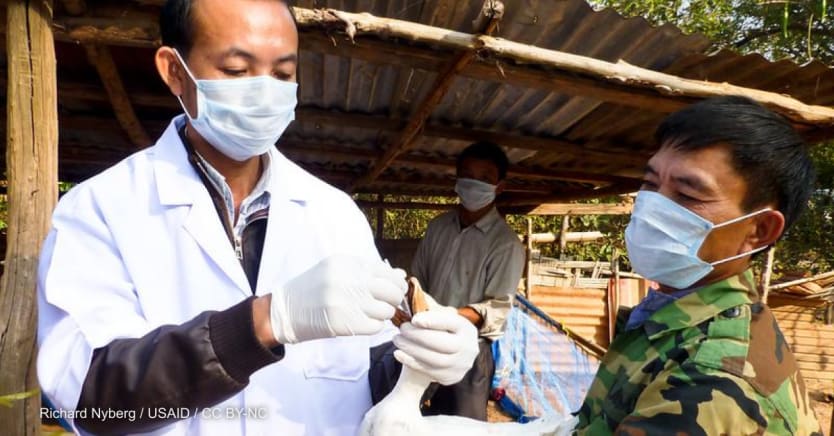
In 2016 — years before the COVID-19 pandemic — Cambodia launched a toll-free hotline to enlist the public in monitoring and tracking the spread of disease among both humans and animals.
People can call 115 to report outbreak signals, such as unexplained sickness in their chickens that could be bird flu — which can also infect people.
At the height of the coronavirus pandemic last year, calls climbed from a few hundred to 18,000 per day. The hotline became the principal means of providing timely information on COVID-19 to the public and is credited for identifying 90% of early coronavirus cases in the country.
The hotline resulted from a partnership between the Cambodian Ministry of Health; Innovative Support to Emergencies, Diseases and Disasters’ iLab Southeast Asia, a technology lab focused on social good; and Ending Pandemics, a San Francisco-based nonprofit organization that is a leader in participatory surveillance systems, or engaging the public in identifying disease outbreaks.
COVID-19 put a spotlight on the need to prepare for pandemics. But Ending Pandemics — whose name refers to preventing future pandemics — has long been partnering with communities and governments worldwide to report on unusual events in humans, animals, and the environment to stop outbreaks. COVID-19 has led to growing interest in its work to change how countries detect and respond to pandemics.
How the pandemic is connecting environmental conservation and public health
There is growing recognition that it is impossible to safeguard human health without protecting natural systems. Many are calling for greater adoption of a collaborative approach called planetary health.
“If you’ve never heard about us for the decade we've been working to get people focused on prevention, and now you're hearing about us in the middle of COVID-19, it sounds like our mission is to end COVID-19,” said Mark Smolinski, an infectious disease physician and president at Ending Pandemics. “Now we have the challenge of getting people to refocus on the fact that we still have to be ready to prevent the next pandemic.”
Ending Pandemics makes a five-year commitment to any country it enters, works directly with communities, and ensures a path for the government to ultimately take the reins.
“We believe that expanding epidemic intelligence is the future of global health,” Smolinski told Devex.
Because most emerging diseases are zoonotic — jumping from animals to humans — the organization takes a “one health” approach, which brings together disciplines focused on people, animals, plants, and their shared environments. Ending Pandemics partners across sectors in its efforts to prevent, detect, and predict outbreaks.
“We're bringing — very intentionally — the human and animal health sector together as an example for how ‘one health’ surveillance can be put into practice,” said Nomita Divi, director at Ending Pandemics.
Putting the ‘public’ in ‘public health’
Ending Pandemics was founded in 2010 as part of the Skoll Global Threats Fund, backed by philanthropist Jeff Skoll, the first president of eBay. It spun out into its own nonprofit entity after Skoll Global Threats Fund sunsetted at the end of 2017. Jeff Skoll, for his part, recently helped quadruple the Skoll Foundation’s grant-making to support COVID-19 response work and has focused much of his philanthropy on pandemic preparedness.
Ending Pandemics’ first project to learn about participatory surveillance — which Smolinski often describes as putting the “public” in “public health” — was a system called Flu Near You that was set up in 2011 to track seasonal influenza in the United States and Canada. Flu Near You serves as a model of “the power of self-reported data from an informed public,” Smolinski said during a session at last month’s Skoll World Forum.
Since then, Ending Pandemics has brought the participatory surveillance approach to some of the highest-risk areas for emerging infections across six continents, working in countries such as Brazil, Cambodia, South Africa, Tanzania, and Thailand.
The organization provides scientific and technical expertise, as well as funding, to help governments, citizens, NGOs, and other partners open lines of communication between the public and health authorities. Other projects include EpiCore, a community of epidemiologists in over 145 countries that volunteer to help verify outbreaks of infectious disease.
The 115 hotline and many tools like it emerged from EpiHack, an epidemiology “hackathon” that Ending Pandemics supports. Another EpiHack project is Participatory One Health Digital Disease Detection, which allows volunteers in Thailand to report unusual disease events. Ending Pandemics is also behind the International Workshop on Participatory Surveillance, which is set to take place in person next year in Cambodia.
Ending Pandemics has a team of 10 and partners with government health authorities, local universities, and technologists. Its funding comes primarily from Jeff Skoll.
To help governments track disease, the organization has created new timeliness metrics that are now being piloted in 27 countries. National governments, donor organizations, and international agencies can use them to identify gaps and track progress in disease surveillance, according to an upcoming article in the Health Security journal by Smolinski and colleagues.
Involving other donors in preventing future pandemics
Now, with unprecedented demand for its expertise, Ending Pandemics is ramping up efforts to get other donors interested in pandemic prevention.
Amid the Ebola epidemic, Ending Pandemics and other entities formed the Pandemic Collective in 2014. Other members include the Skoll Foundation, The Rockefeller Foundation, Resolve to Save Lives, the Wellcome Trust, In-Q-Tel, Open Philanthropy, Flu Lab, the Bill & Melinda Gates Foundation, and Intellectual Ventures.
The Pandemic Collective has helped members explore the connections between their portfolios and growing zoonotic disease risk.
“[Amid COVID-19], we have the challenge of getting people to refocus on the fact that we still have to be ready to prevent the next pandemic.”
— Mark Smolinski, president, Ending PandemicsThe group typically holds monthly phone calls and two annual meetings in person, with the last face-to-face gathering taking place in January 2020 at the Ending Pandemics office in San Francisco, where the collective heard from the World Health Organization about its Epidemic Intelligence from Open Sources initiative.
The work that Ending Pandemics and others have done in participatory surveillance systems has paid off amid COVID-19.
While many of these tools were developed for supporting public reporting to government officials to stop outbreaks at the source, they emerged as “trusted conduits of information in two directions,” allowing governments to communicate with the public about their COVID-19 responses, Smolinski said.
Once communities see that governments will be responsive to their concerns, the list of use cases is endless, he said. “That’s the dream,” Smolinski added.
For example, participatory surveillance tools in Thailand have been used not only to track disease but also to measure air pollution and identify counterfeit drugs.
Ending Pandemics’ approach is grounded in the idea that effective disease surveillance must be locally owned and created.
“We make sure governments are engaged from the beginning,” Divi said. “At the end of the day, the health of their population is their responsibility.”
This coverage, presented by the Bay Area Global Health Alliance, explores the intersection between technology, innovation, and health. How are tech, innovation, and cross-sector partnerships being leveraged to accelerate equitable access to health care?









